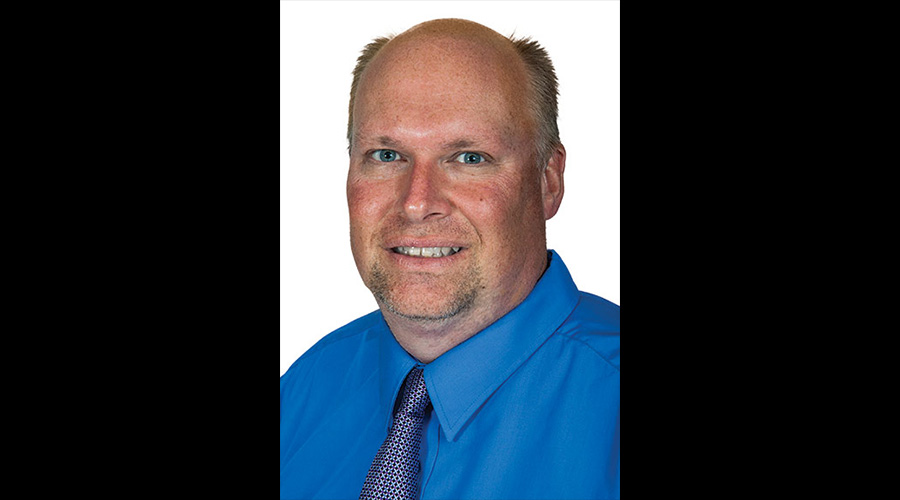Marketing Maintenance: Savvy Managers Spotlight Department Accomplishments
By Dave Lubach, Associate Editor
OTHER PARTS OF THIS ARTICLEPt. 1: This Page

J.D. Hardy,
Associate Director for Engineering Services, Mississippi State University
|

Darin Hargraves,
Director of Maintenance and Operations, Anchorage (Alaska) School District
|

Anand Sankey,
Director of Engineering and Maintenance Services, Western Michigan University
|
For too long, maintenance and engineering departments have suffered from an "out of sight, out of mind" attitude within institutional and commercial facilities. But more often today, managers are taking steps to change that mentality by shining a spotlight on their departments' accomplishments. Three managers — all of whom are past or present Facility Maintenance Decisions Achievement Award winners — discuss strategies for marketing their departments.
Q: Is it difficult to embrace the idea of promoting department successes within the organization?
HARDY: Not really. We just feel like we are telling our story, and we believe it is a story worth telling. We don't really see it as promoting any one person's success. For us, it is promoting successes of Mississippi State University. We all wear maroon (one of the school's colors) around here, so one department's success should be shared and appreciated by everyone.
HARGRAVES: Not at all. As a department head, I feel that promoting the department is part of my job description. One of the things I tell my workers is that we are in the service industry and we have a customer. Keeping them happy is imperative to our long-term success. Letting people in the organization know how great (the department is) is critical to developing a positive impression. This is especially important when budgets get tight and we need to compete for resources. Experience has taught me that those departments viewed as being efficient, and meeting the needs of their clients, tend to fair better at budget time.
SANKEY: It comes down to personalities and what your style of leadership is. We seem to do a pretty good job of not bragging, but sharing our successes. We have a few leaders here that do a very nice job with that. Personally, me, I tend not to share our successes. We have engaged the news media and magazines and so forth, and had a couple of state people come down and shared our success stories on energy conservation and sustainability. We've had the Michigan Department of Environmental Quality come down for our sustainable practices. Those are just a few. We had one example where we installed 20 charging stations on campus and brought the Michigan state senator down for an unveiling with the president of the university. We've done our fare share of that.
Q: Do you feel that others in the organization understand the impact maintenance and engineering departments have on facilities?
HARDY: Well, they certainly do when the infrastructure quits working. I see it that we go through seasons when things are working well, and everyone tends to forget the day-to-day efforts that make this possible. And then there are seasons when there is something that makes everyone take notice. This could be a breakdown, a major improvement project, or even a magazine article that draws everyone's attention. And there are often times when we get that positive customer feedback that go a lot further than anyone realizes.
HARGRAVES: I would like to think so. This is especially true from the "paint out," the stuff they see, but we work hard to educate people on the maintenance they don't see. I was told recently that our facilities are insured for multiple billions of dollars and that amount of investment needs to be protected. Our philosophy is that if you don't have the money to replace it, then you better maintain it. While people value our contributions, we need to provide the data to quantify more clearly how our contributions benefit the organization.
SANKEY: It depends on the group. We have what we call building coordinators. They are not facilities people. Every building has a point person for facilities-related issues. Those people are the ones that everybody goes to within a building in order to provide the requirements as far as whether it's custodial, landscape, temperature, carpentry, anything related to maintenance and operations. Those people have a sense of what we do. The other area I think has a big, huge impact is orientation at admissions. They see the landscape when they bring potential parents and students to campus. They see the impact of clean buildings, well-maintained yards and landscapes. There are pockets within the organization that understands and there are others that probably don't see the importance of what we do.
Q: What are the potential benefits of marketing the department to facility executives and occupants?
HARDY: As an engineer, my goal is to improve the quality and efficiency of our systems. As the leaders in our organization get more comfortable with our capabilities, then they will trust us to execute more and more of our projects and initiatives. Each project, no matter how big or how small, is an opportunity to market our abilities. We want to deliver at a level above expectations so that our stakeholders look forward to what we can do next.
HARGRAVES: The biggest long-term benefits are sustainability, viability and credibility of our department within the organization. With budgets getting tighter, it is getting progressively more difficult to maintain our service at current levels. If we were to sustain continued erosion of our budget over time, some of our services could become unviable or too expensive to continue. Marketing or educating others on our contributions helps to give us credibility in our discussions with the administration and policy makers.
SANKEY: It's the service we provide. Most of the time, 90 to 95 percent of the service we provide is at no cost. We're here to provide a service to the students that live on campus and the faculty and staff that works in buildings and teach in classrooms. If they only knew that we're here to serve them if it's temperature- related, or a bathroom fixture, a door that doesn't close, or an IT issue, I think we've always been supporting the larger mission, which is education. The benefit of us marketing ourselves to the campus is to say we're here supporting the greater mission. We are fortunate to have a facility executive that understands facilities, understands that it takes financial commitments to have reliable campus operations.
Q: Has promoting the department actually delivered results?
HARDY: Absolutely, our energy conservation and sustainability programs are a perfect example of this. When we began to achieve measurable success in terms of lower energy intensity and avoided costs, this paved the way to more initiatives being approved.
HARGRAVES: A couple of years ago, we were asked to cut more than 10 percent of our labor budget, and there was a lot of concern about how this could be accomplished without devastating our program. Ultimately, we chose to evaluate our key performance indicators (KPIs) utilizing a multi-dimensional approach. What we found was our schools didn't have an equitable allocation of resources. We had one high school being cleaned at 24,000-square-feet per employee and another at 36,000 per employee. Knowing the cuts would impact some schools more than others, we benefited greatly from a presentation we gave to the school board on our process. We benefited by letting all parties know that the process was done fairly and that ultimately, all schools were receiving the same level of support. It was a fair program evaluation, an impartial reallocation of labor.
SANKEY: It has. In two areas, one is we did a huge energy conservation push. We've been doing energy conservation since the 1980s, but in 2012 we did a little bigger push with some dollars attached to it. It was through performance contracting, and as a result of that we had a huge celebration at the end of the event, attended by several people from the state of Michigan as well as students. As a result of it, it's become a talking point among students, faculty and senior leadership that we are at the forefront of energy conservation. Similarly, in stormwater management on campus, we've got so much recognition with the state, that we are a poster child for other universities in the state of Michigan, and we continue to get federal and state grants that are available. We have so much that we've done. We've continued to show improved water quality on campus, going to a greater watershed area, and we seem to continue to get grants because we are doing positive things with the funding we've received up to this point.
Q: What are examples of actions you taken to promote department accomplishments?
HARDY: We have submitted news releases on sizeable projects. We have worked with student groups during events like Earthweek. We have set up booths at on-campus events and been interviewed by various news outlets, including the student newspaper. We have participated in online videos with the university. And I certainly take any opportunity to speak at a seminar whether internal or external to the university. Many of these opportunities relate to sustainability and energy awareness. Additionally, our campus services group has put a lot of effort into updating our webpage so that those on campus and off campus can find out current information about campus facilities, as well as learn about what we do.
HARGRAVES: The first 15 years of my career was in sales so I must say that promotion is somewhat in my blood. Whenever I speak with a principal, an administrator or a community member, I like to leave them with a good feeling about our department. As I previously mentioned, we developed a fairly unique approach to cutting our custodial department utilizing KPIs and I was very open to sharing the building level data with principals. Cutting is never pleasant but the principals knew that our custodial cuts were fair and that all buildings would be staffed equitably. From the maintenance side of the house, I recently made a case to bring snow removal back in-house after having it outsourced for several years. I have a large chart hanging in my office that I used when talking to the administration building demonstrating how we could do snow removal less expensively. That was a fun exercise in which we had to address a multitude of issues — issues that each needed a different approach. Finance, purchasing, human resources and the superintendent's office all had a different set of questions and concerns. It took a long time to convince all parties that this was the best approach but we ultimately won the day by being diligent and flexible.
SANKEY: We do have some open forum sessions on campus where we invite people to come in and explain to them how systems work. We have Facilities Connection, which is a magazine we publish and send out to the campus community. We have energy competitions on campus, as well as recycling, and try to get out to resident halls and talk to students about conservations, getting into student organization newspapers, and hire students, getting them engaged in what engineering and maintenance does. We'll go to the college of engineering and provide lectures, and engage in a series of discussions and bring them to the power plant in order to facilitate physical connections as to what they're learning in the classroom and what they do.
Q: What other plans do you have to promote department accomplishments?
HARDY: Our business management office has done a very good job trying to update our online presence. They are leading the way in making our services and abilities more known throughout our organization. Additionally, our leadership takes every opportunity to promote our department, whether speaking with groups within the university or to external groups.
HARGRAVES: Honestly, I would hope that we promote our business a thousand times a day by the good work we do. We are continuously reminding our employees that we are in a service industry. We provide a service for our clients in school facilities. Our goal is to meet those needs as expertly and as cost effectively as possible. If we do that, then we should be able to survive as a department, and if we are lucky, maybe even grow.
SANKEY: There's a huge missing opportunity that exists, and that is the human behavior change that we're trying to get some traction on. This relates to the fact that we have a huge faculty and staff on campus, about 4,000, and we have 25,000 students. We do well in the area of equipment upgrades and conservation, but one area that's hard to change is the mindset of people — how they operate or use a building. That's been the largest struggle. Because we have a transient population of students — every four years they rotate through campus — and the other aspect is the faculty and staff understanding what they do on campus has a huge impact on utilities. Those are two areas where we would like to focus on to have them embrace this whole sustainable approach and why it's important that what they are doing has a longstanding impact on campus, not just in utilities, but the environment as a whole. Our other initiative is not to start with kids once they come to college to promote conservation and sustainability but go back to K through 12 to tell them what conservation is, so by the time they arrive at college, they actually have an understanding of what it is.
Related Topics:















